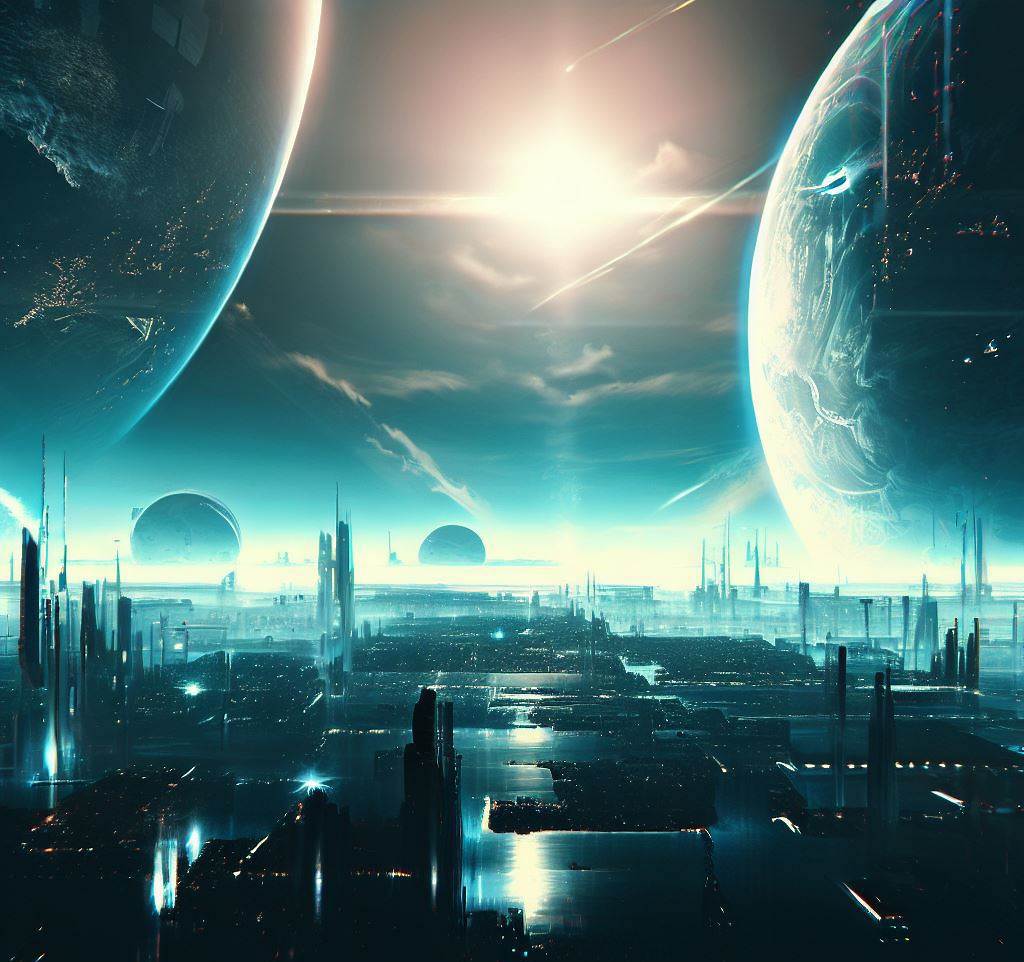2050: A Glimpse into the Future of Our Planet
What Do You Think The World Will Look Like In The Future?

By the year 2050, our world will undergo a remarkable transformation as artificial intelligence (AI) becomes ubiquitous. AI-driven technology will permeate various aspects of our daily lives, reshaping industries and revolutionizing the way we interact with the world around us.
AI-powered stores will become the norm, allowing people to purchase goods seamlessly without the need for cashiers or waiting in lines. Furthermore, AI will take on roles previously handled solely by humans, such as diagnosing and treating patients, managing transportation systems, and analyzing vast quantities of data for various purposes. AI chat bots and voice recognition systems will be so advanced that they will mimic real people in their conversations and behavior.
The integration of AI into robotics will bring about a new era of automation. By 2050, robots will serve as companions, with robot dogs and other pets being common sights in households. Robots will dominate factories and take up various professional roles, acting as teachers, cooks, pharmacists, law enforcement officers, athletes, and more.
Communication will become seamless with the help of universal translators and widespread voice recognition technology, eradicating language barriers. Our clothes, homes, and surroundings will be equipped with hundreds of sensors to monitor our well-being and enhance our lives.
Advancements in computing will be significant by 2050, with the possibility of quantum computers surpassing current transistor-based models, providing immense computing power. AI and computers will be integrated into the human brain through technologies like Elon Musk's Neuralink, benefiting individuals with neurological disorders such as Alzheimer's, Parkinson's, spinal cord injuries, and blindness. People will be able to control computers and prosthetics through brain signals, and the concept of mind-controlled interactions will emerge.
Prosthetics, too, will undergo significant advancements, with robotic prosthetics possibly surpassing the strength and capabilities of biological limbs. Prosthetic eyes and ears will become available, providing solutions for those with visual and hearing impairments.
Virtual reality (VR) will be an integral part of our lives, with people engaging in a wide array of activities in VR environments. Virtual reality closets will allow individuals to try on and experience various clothing styles without leaving their homes, and holograms will elevate video calls to a whole new level. VR platforms will enable users to explore different locations and even experience life on other planets from the comfort of their homes.
In summary, the world in 2050 will be a technologically advanced and interconnected place, with AI, robotics, virtual reality, and innovative medical technologies shaping our daily experiences and redefining what is possible.
In 2014, approximately 320,000 new electric vehicles (EVs) were registered globally. However, the adoption of EVs accelerated significantly, and by 2019, this number had surged to 2.3 million. Projections indicate that by 2025, global EV sales will surpass 10 million, and by 2050, the majority of automobiles on the roads will be electric. As a result, traditional gas stations will fade away, replaced by at-home charging stations that can quickly refuel vehicles in as little as 10 minutes.
The automotive industry is also heading towards a future of driverless cars. Companies like Tesla have already implemented advanced autopilot features, reaching a level two automation on the Society of Automotive Engineers' ranking. Tech giants like Google have invested billions in self-driving technology, and it is expected that fully autonomous level five vehicles will be available to consumers in the late to mid-2020s, becoming commonplace in the 2030s. By 2050, people will be getting into cars without steering wheels, and autonomous vans and semi-trucks will efficiently deliver packages and shipments across countries with no need for human intervention. Drones will serve similar purposes, handling shorter-distance deliveries, including from floating or vertical warehouses. Surveillance, security, construction, entertainment, and agriculture will all benefit from drone technology advancements.
Electric Vertical Takeoff and Landing Aircraft (eVTOLs) will revolutionize urban transportation. Several working prototypes exist, and companies like Uber and Airbus are actively pursuing aerial ride-sharing and drone-like concepts for urban mobility. As technology progresses, aerial taxis could become a common sight in cities by 2050. Elon Musk's vision of 3D roads, involving either flying cars or tunnels, could also reshape transportation. Musk's Boring Company is already experimenting with underground tunnels, and if successful, cities might have extensive tunnel networks by 2050.
Another transformative transportation concept is the Hyperloop—a high-speed train inside a vacuum maglev tube. With speeds of up to 700 miles per hour, the Hyperloop could drastically reduce travel times between cities. By 2050, we might see these systems connecting major urban centers and potentially replacing conventional domestic flights.
The energy sector is undergoing a significant transformation as well. The cost of solar and wind power has plummeted over the past decade, making them more economical than natural gas and coal in many cases. However, energy storage remains a challenge. Researchers are exploring various methods, such as storing energy as heat, compressing air, and converting air into liquid. These innovations will play a crucial role in achieving large-scale utility storage, enabling renewables to provide nearly half of all global electricity by 2050.
As an even more futuristic prospect, fusion power is being pursued as a potentially game-changing energy source. The ITER project in France, a $20 billion initiative, aims to test the feasibility of fusion for power generation. By 2050, fully functional fusion power plants could be operational, providing a highly efficient and sustainable source of energy.
In summary, the future is poised to be shaped by electric vehicles, driverless transportation, advanced drone technology, renewable energy dominance, and potentially revolutionary power sources like fusion. These developments promise a dramatically different world, with greener and more efficient ways of living and moving about.
NASA's Artemis program has an ambitious goal to land humans back on the moon by 2024. Joining the endeavor, private companies like SpaceX, Dynetics, and Blue Origin are working on developing lunar landers for the mission. However, NASA's ambitions extend further, as they plan to send humans to Mars in the 2030s. SpaceX, in particular, has an even more aggressive timeline, aiming to use their Starship rocket to reach Mars by 2024. Once there, SpaceX envisions establishing a permanent colony, with Elon Musk envisioning a Martian city with a population of up to 1 million people by 2050. SpaceX is also working on the Starlink project, deploying thousands of satellites to create a highly advanced global broadband internet system.
Beyond SpaceX, other major players like Blue Origin, Boeing, Lockheed Martin, and Virgin Galactic are also vying for their place in the space race. As a result, the next three decades could see the establishment of a permanent moon colony, space hotels in orbit, and humans becoming inhabitants of Mars.
The food industry is also undergoing significant transformations. With concerns about the environmental impact of meat production, the demand for meat alternatives is growing rapidly. Companies like Beyond Meat and Impossible Foods have already become valued in the billions as they cater to the rising popularity of plant-based diets. Additionally, cultured meat, produced through in vitro cell culture, offers a more sustainable and animal-friendly alternative to traditional livestock farming. By 2050, it's foreseeable that in vitro meat products, like T-bone steaks, will be readily available to meet the needs of a growing population while minimizing the environmental impact.
In response to the need for efficient food production, farming methods are evolving. Vertical farming, where crops are grown in stacked layers indoors, is becoming a prominent solution. With this approach, large-scale vertical farms are expected to spread across the globe by 2050, providing sustainable food sources while utilizing minimal land and water resources.
Advancements in biotechnology are poised to revolutionize healthcare. Stem cells show great promise in regenerating injured or diseased tissues, offering potential treatments for Parkinson's, Alzheimer's, diabetes, heart disease, cancer, arthritis, and more. Gene editing technology, particularly CRISPR/Cas9, allows scientists to modify DNA strands, potentially curing lifelong inherited diseases in the future.
In summary, the next three decades hold the promise of significant achievements in space exploration, a transformation of food consumption towards more sustainable alternatives, and groundbreaking advancements in biotechnology that could revolutionize healthcare. As technology continues to advance, humanity stands at the precipice of a new era with possibilities previously thought to be the realm of science fiction becoming attainable realities.
About the Creator
Always Curious
Curiosity is a quality related to inquisitive thinking such as exploration, investigation, and learning. It is an eager wish to know or learn about something. Curious people ask questions, read and explore.






Comments
There are no comments for this story
Be the first to respond and start the conversation.